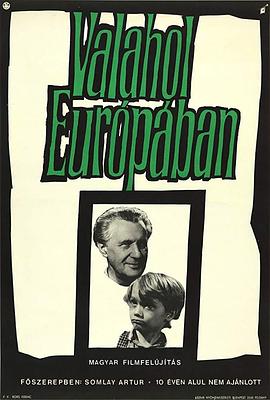简介
Somewhere in the remote region, the war ends. In the midst of ruined cities and houses in the streets, in rural hamlets, everywhere where people still live, are children who have lost their homes and parents. Abandoned, hungry, and in rags, defenseless and humiliated, they wander through the world. Hunger drives them. Little streams of orphans merge into a river which rushes forward and submerges everything in its path. The children do not know any feeling; they know only the world of their enemies. They fight, steal, struggle for a mouthful of food, and violence is merely a means to get it. A gang led by Cahoun finds a refuge in an abandoned castle and encounters an old composer who has voluntarily retired into solitude from a world of hatred, treason, and crime. How can they find a common ground, how can they become mutual friends The castle becomes their hiding place but possibly it will also be their first home which they may organize and must defend. But even for this, the price will be very high. To this simple story, the journalist, writer, poet, scriptwriter, movie director, and film theoretician Béla Balázs applied many years of experience. He and the director Géza Radványi created a work which opened a new postwar chapter in Hungarian film. Surprisingly, this film has not lost any of its impact over the years, especially on a profound philosophical level. That is to say, it is not merely a movie about war; it is not important in what location and in what period of time it takes place. It is a story outside of time about the joyless fate of children who pay dearly for the cruel war games of adults. At the time it was premiered, the movie was enthusiastically received by the critics. The main roles were taken by streetwise boys of a children's group who created their roles improvisationally in close contact with a few professional actors, and in the children's acting their own fresh experience of war's turmoil appears to be reflected. At the same time, their performance fits admirably into the mosaic of a very complex movie language. Balázs's influence revealed itself, above all, in the introductory sequences an air raid on an amusement park, seen in a montage of dramatic situations evoking the last spasms of war, where, undoubtedly, we discern the influence of classical Soviet cinematography. Shooting, the boy's escape, the locomotive's wheels, the shadows of soldiers with submachine guns, the sound of a whistle—the images are linked together in abrupt sequences in which varying shots and expressive sharp sounds are emphasized. A perfectly planned screenplay avoided all elements of sentimentality, time-worn stereotypes of wronged children, romanticism and cheap simplification. The authors succeeded in bridging the perilous dramatic abyss of the metamorphosis of a children's community. Their telling of the story (the scene of pillaging, the assault on the castle, etc) independently introduced some neorealist elements which, at that time, were being propagated in Italy by De Sica, Rossellini, and other film artists. The rebukes of contemporary critics, who called attention to formalism for its own sake have been forgotten. The masterly art of cameraman Barnabás Hegyi gives vitality to the poetic images. His angle shots of the children, his composition of scenes in the castle interior, are a living document of the times, and underline the atmosphere and the characters of the protagonists. The success of the picture was also enhanced by the musical art of composer Dénes Buday who, in tense situations, inserted the theme of the Marseilaise into the movie's structure, as a motive of community unification, as an expression of friendship and the possibility of understanding. Valahol Europaban is the first significant postwar Hungarian film. It originated in a relaxed atmosphere, replete with joy and euphoria, and it includes these elements in order to demonstrate the strength of humanism, tolerance, and friendship. It represents a general condemnation of war anywhere in the world, in any form.
猜你喜欢
-
HD
暗战国语
主演:刘德华,刘青云,蒙嘉慧,李子雄,许绍雄,林雪,黄卓玲,艾威,林伟健,Robert,Sparks,洪伟良,罗靖庭,邱万城,Paco,Yick,South,Kei,Lee,张浚鸿,李子明,李寿祺 -
HD
异度空间国语
主演:张国荣,林嘉欣,李子雄,周嘉玲,徐少强,潘美琪 -
HD
纯白的声音国语
主演:谭耀文,蒋雅文,魏骏杰 -
HD
第十九层空间国语
主演:钟欣潼,泳儿,谭俊彦,谭耀文,李曼筠,冼色丽,蔡卓妍 -
HD
永不失联的爱
主演:郭俊辰,孙伊涵,周彦辰,葛鑫怡,丁真珍珠,翁虹,韩栋,吕一,段奥娟,陈博豪,沈雨,杨曼聆 -
HD
上海皇帝之雄霸天下国语
主演:吕良伟,郑则仕,徐锦江,刘嘉玲,叶童 -
HD
黑狱断肠歌之砌生猪肉国语
主演:梁朝伟,吴孟达,林国斌,吴毅将,张文慈,徐锦江,李兆基,吴志雄 -
HD
东邪西毒国语
主演:张国荣,林青霞,梁朝伟,张学友,张曼玉,刘嘉玲,梁家辉,杨采妮,邹兆龙 -
HD
春娇与志明国语
主演:杨千嬅,余文乐,杨幂,徐峥,陈逸宁,林兆霞,谷德昭,詹瑞文,司徒慧焯,黄晓明,郑伊健,王馨平,田蕊妮,邵音音,曾国祥,谷祖琳,方皓玟,闫汶渲,刘浩龙,周子扬,黄素欢,王太利,彭浩翔,郝蕾,尹志文,魏雨琦 -
HD
南海十三郎国语
主演:谢君豪,潘灿良,苏玉华,梁汉威,吴绮莉,黄霑,周志辉 -
HD
神枪手国语
主演:任贤齐,黄晓明,陈冠希,叶璇,刘浩龙,廖启智,邓健泓,方皓玟,王秀琳,高捷,林保怡,刘国昌 -
HD
提防老千国语
主演:张家辉,王晶,陈炜,张兆辉

